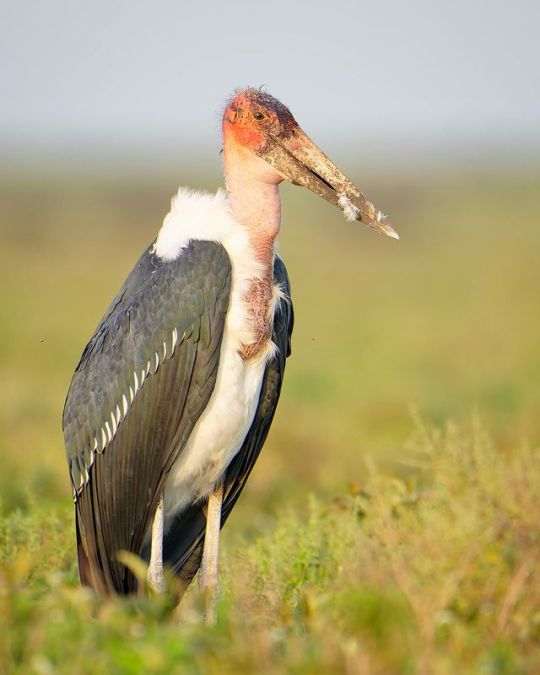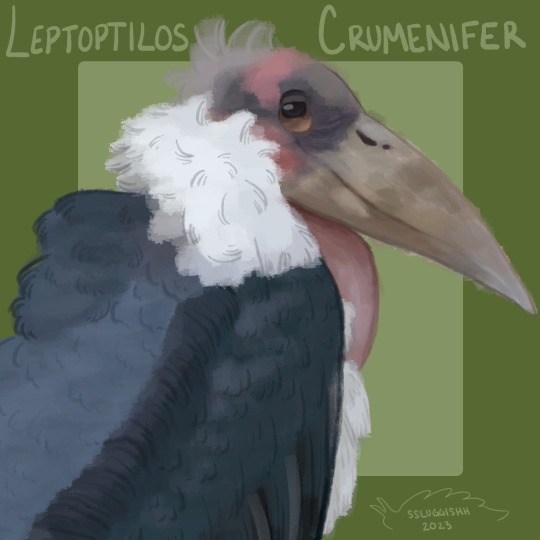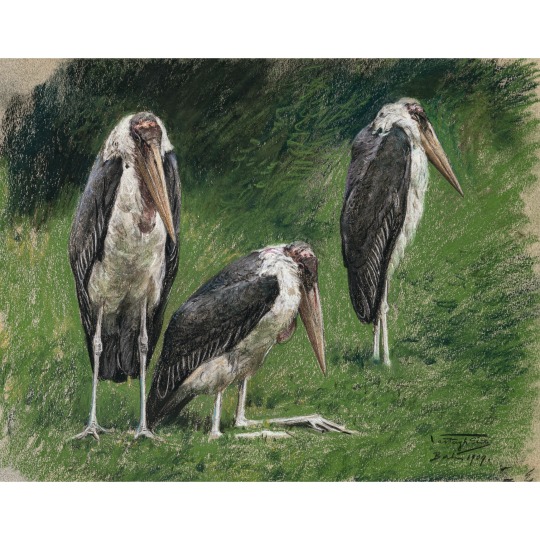#leptoptilos crumenifer
Explore tagged Tumblr posts
Text

A marabou stork (Leptoptilos crumenifer) perches in a tree in Maasai Mara National Reserve, Kenya
by praveen pandian
#marabou stork#storks#birds#leptoptilos crumenifer#leptoptilos#ciconiidae#ciconiiformes#aves#chordata#wildlife: kenya#wildlife: africa
117 notes
·
View notes
Text

marabou stork i love you ugly bird
115 notes
·
View notes
Text

Marabou Stork
69 notes
·
View notes
Text

a quick marabou stork for tonight :]
12 notes
·
View notes
Text
FINAL MATCH
Marabou Stork (Leptoptilos crumenifer)
They kill and eats flamingos as well as anything else they can fit in their giant mouths. They eat fecal matter. They eat crocodiles. They eat trash out of dumpsters. They’ve eaten shoes. They’ll attack you if you don’t give them your shoe. They have no natural predators besides MAYBE lions and some parasitic nematodes.
VERSUS
Giant Petrel (genus Macronectes)
They’re very violent hyper aggressive predatory birds that will kill a seal and dance on its dead body (this is called sealmaster posture) to show everybody else that nobody can do what this bird can do. They love to batter and drown other birds to death—including albatrosses! They’re often dyed red with the blood of their enemies.

711 notes
·
View notes
Text
For #WorldStorkDay :

Géza Vastagh (Hungarian, 1866–1919)
Three Marabous, 1909
pastel on cardboard
H 38 x W 48.5cm
Private Collection
🆔 Marabou Stork (Leptoptilos crumenifer), native to sub-Saharan Africa.
“[Vastagh’s] work is dominated by animal depictions, especially lions, but the animals of the Hungarian Puszta also influenced his work. With a government scholarship he traveled to North Africa, Algeria and Tunis in 1898 and was able to portray the animals in their natural habitat. He also found his motifs in the zoos of Berlin, Hamburg and Leipzig.”
#animals in art#animal holiday#european art#20th century art#birds in art#bird#birds#stork#Marabou Stork#African animals#pastel#drawing#Géza Vastagh#Hungarian art#World Stork Day#species ID
56 notes
·
View notes
Text


Today's Bird of the Day is the Marabou Stork
The Marabou Stork (Leptoptilos crumenifer) is a large African wading bird, known for its bald head, massive beak, and pink throat pouch. Reaching heights of up to 5 feet and boasting a wingspan of 12 feet, it is among the largest storks. A skilled scavenger, it feeds on carrion, small animals, and refuse, playing a vital ecological role in waste cleanup. Found across sub-Saharan Africa, Marabou Storks thrive in wetlands, savannas, and urban areas. Though often seen as unattractive, their scavenging helps control disease. Despite habitat challenges, they are listed as Least Concern by the IUCN due to their adaptability.
Read more here
Photo taken by me at this location
#birds#birdblr#bird photography#bird#birding#birdwatching#birders#bird of the day#bird watching#stork#marabou stork
7 notes
·
View notes
Text

Marabou Stork Leptoptilos crumenifer
3/2/2022 Disney's Animal Kingdom
#bird#bird photography#birds#marabou stork#disney's animal kingdom#animal kingdom#zoo#zoo photography#zoos#my photos
7 notes
·
View notes
Note
Silly Game Time: AFRICAN ANIMAL TIME! Use a random letter generator, then look up African animals that start with that letter. What's one of them? Post a picture of it!
Marabou Stork
The marabou stork (Leptoptilos crumenifer) is a large wading bird in the stork family Ciconiidae native to sub-Saharan Africa. It breeds in both wet and arid habitats, often near human habitation, especially landfill sites. It is sometimes called the "undertaker bird" due to its shape from behind: cloak-like wings and back, skinny white legs, and sometimes a large white mass of "hair." It has the largest wingspan of any land bird, with an average of 2.6 metres (8.5 ft) and some recorded examples of up to 3.2 metres (10 ft). (Wikipedia)

By Charles J. Sharp - Own work, from Sharp Photography, sharpphotography, CC BY-SA 4.0, https://commons.wikimedia.org/w/index.php?curid=54788428
3 notes
·
View notes
Photo

Marabou Stork (Leptoptilos crumenifer)
© William Bezodis
180 notes
·
View notes
Photo

Marabou storks (Leptoptilos crumenifer) scrap over food in the Okavango Delta, Botswana, Africa
by Fabrice Stoger
#marabou stork#marabou#storks#birds#Leptoptilos crumenifer#Leptoptilos#ciconiidae#Ciconiiformes#aves#chordata#wildlife: botswana#wildlife: africa
42 notes
·
View notes
Text





Marabou Storks
Source: Al-Wabra Wildlife Preservation
#absolutely fucking lost for words here#my posts#ciconiiformes#ciconiidae#leptoptilos#leptoptilos crumenifer
173 notes
·
View notes
Photo

Marabou stork (Leptoptilos crumenifer)
Photo by Jon Atkinson
#marabou stork#stork#leptoptilos crumenifer#leptoptilos#ciconiidae#ciconiiformes#aequornithes#ardeae#aequorlitornithes#neoaves#neognathae#aves#therapoda#archosauria#sauropsida#reptilia#tetrapoda#vertebrata#chordata
51 notes
·
View notes
Photo

Marabou Stork by Ruth
Marabou Stork (Leptoptilos crumenifer)
231 notes
·
View notes
Text
It’s Happening.
REAL QUARTERFINALS
Marabou Stork (Leptoptilos crumenifer)
They kill and eats flamingos as well as anything else they can fit in their giant mouths. They eat fecal matter. They eat crocodiles. They eat trash out of dumpsters. They’ve eaten shoes. They’ll attack you if you don’t give them your shoe. They have no natural predators besides MAYBE lions and some parasitic nematodes. There is something deeply wrong with them.
VERSUS
Flamingo (family Phoenicopteridae)
They’re extremophiles! They live in the most boiling acidic water and they do not give a shit! They drink, nest in, and live in boiling, hypersaline, toxic water that will strip a human’s skin away! And they’re pink!

62 notes
·
View notes
Photo

A marabou stork looks for fish in a plastic bag after taking it from a market in Uhuru Park, Nairobi, Kenya
Photograph: Daniel Irungu/EPA
(via Week in wildlife – in pictures | Environment | The Guardian)
#Marabou Stork#Leptoptilos crumenifer#Leptoptilos#Ciconiidae#Ciconiiformes#Aves#birds#stork#environment#plastic#Kenya
18 notes
·
View notes